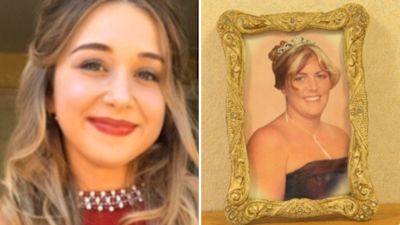Families of women killed by their partners call for tougher restrictions on where murderers can live

Watch: ITV West Country's Will Charley speaks to the families of Julie Butcher and Ellie Gould
The families of two women who were violently killed by their ex-partners are calling for increased restrictions on where murderers can live when they are released from prison.
Julie Butcher was murdered in Chiseldon in 2005 while Ellie Gould was killed in Calne in 2019.
Julie was just 25-years-old and was attacked by her ex-husband after years of abuse. Her death left three young children without a mother.
Ellie also died at the hands of her ex-partner. The seventeen-year-old was brutally attacked in her family home after breaking up with her school boyfriend, Thomas Griffiths.
Both perpetrators were handed life sentences and put behind bars - but the man who killed Julie has since been released. He initially returned to live near Julie's family, causing huge stress to her relatives.
Julie's sister, Emma King, said: "We just thought, 'how are we going to live in an area when we know this man is going to come out'.
"And we'd have to live in the same area: too scared to go out of the house, too scared to go out to the shops, living on eggshells, tip-toeing around."
Julie's family worked with the justice system to create an exclusion map, banning him from coming within a certain distance of her relatives. But Ms King believes the map did not go far enough.
She said: "We just feel that we have to stick to that map ourselves, we don't like going outside that exclusion map.
"And if we do go outside that exclusion map, there's a high chance we'll bump into him again - bearing in mind the radius is two-and-a-half miles at the minimum."
Ms King is now calling for a change to the law so that convicted murderers cannot live within 50 miles of their victims' families when they are released from prison.
'It petrifies me - the thought of bumping into him, and it's not just us'
She's been joined by Ellie Gould's mother, Carole, who still lives in Calne.
Ms Gould said: "It was only when I met Emma and she told me about her case. I was absolutely horrified that the radius could be as little as two-and-a-half miles, which means Griffiths could come back and live in Derry Hill.
"It petrifies me, the thought of bumping into him. And it's not just us, it's Ellie's friends. Ellie's friends who all live in the area - they're petrified of bumping into him.
"There needs to be much better rights for the victims," she added.
The families of Julie and Ellie believe the parole board currently places too much emphasis on rehabilitating murderers and not enough on ensuring the families of victims feel able to live their lives.
Ms Gould said: "A murderer is on a life sentence, their conviction is never spent. We're the ones that have a life sentence, we've lost our loved ones.
"We should be allowed to live where are friends and family and where our support network are - in peace, and not live in fear of bumping into them.
"It shouldn't be us that are driven out of the area, it should be them that are not allowed back into the area," she said.
The pair would like to see an amendment to the Victims and Prisoners Bill currently being discussed in Parliament, to establish the 50-mile radius in law.
Ministry of Justice: 'Murderers already face strict licence conditions'
Responding to their calls to impose a 50-mile radius on where murderers can live, a spokesperson for the Ministry of Justice told ITV West Country: “Murderers already face some of the strictest licence conditions – including exclusion zones to protect victim’s families.
"If these conditions are broken they face being sent straight back to prison.”
How plausible is a 50-mile exclusion zone for convicted murderers?
Ian Kelsey, a criminal solicitor in Bristol, believes that the proposals being put forward by Emma King and Carole Gould are not "likely to happen
Speaking to ITV West Country, Mr Kelsey said: "I think the great problem here is when you try and legislate and give fixed areas, geographical areas where someone can't go, it can create injustice.
"For example, if you have a youngster who is convicted of murder and is maybe released after nine or ten years, the idea would be that he would probably be going back to the support of his family, if they are within the same area.
"They're not going to rehabilitate back into society unless that support is there."
Mr Kelsey added that the parole board are "very keen to take into account the victim's relatives views and desires", but that it is only one of several factors.
He said: "The predominant factor is, 'Will the perpetrator be a risk to the community as a whole?', and if they deem he's not at risk, it seems to me it's unlikely that they're going to want to fix a limit."
Responding to criticism that victims' rights are placed beneath those of murderers, Mr Kelsey said he didn't "think that's right".
"One has to look at the overall position and 50 miles is a very big distance to say someone shouldn't go within that area," he said.
"So, I don't think you can legislate, I think once the law comes in and tries to provide legislation and certainty, it can actually make a complete mess of things."
Mr Kelsey concluded: "There is no easy answer... You should be leaving it to the discretion of the parole board, who are very skilled at looking at these things and making decisions based on all the factors they have to address."